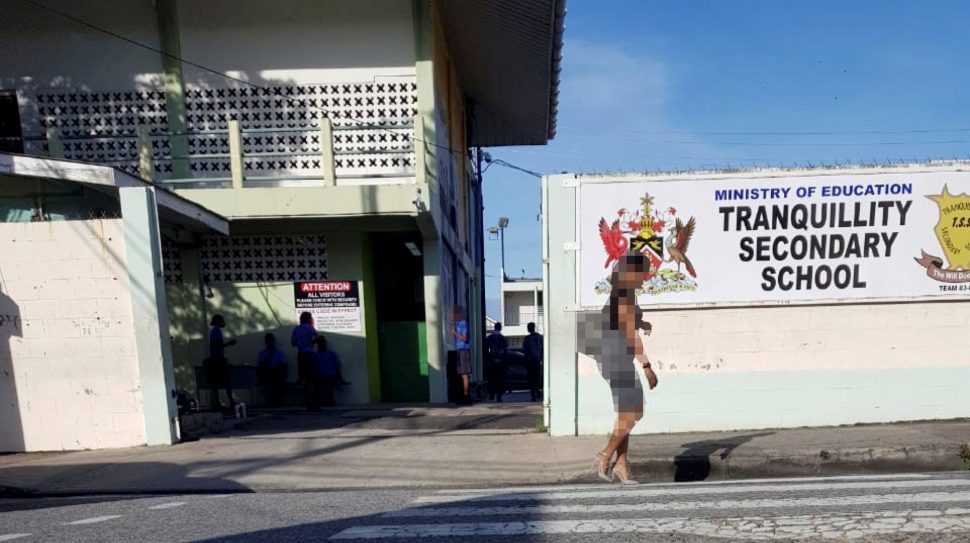(Trinidad Guardian) Even as investigations continue into the cheating scandal which occurred during last Wednesday’s CSEC Math exam at the Tranquillity Government Secondary School, a parallel investigation has been launched into the absence of a key senior official who ought to have been present at the institution on the day.
Claiming the school was one which sometimes presented “challenges”, officials at the Ministry of Education said the individual took a day off. Checks revealed that a similar pattern had been observed in relation to the official’s absence every time a situation arose at that particular school.
Although teachers and principals are entitled to 14 days occasional leave during the academic year, a senior ministry official said arrangements should have been made by the official to be present on the day as it was important to ensure proper controls were in place.
The Tranquillity Government Secondary School was used by the Caribbean Examinations Council (CXC) to house three exam centres.
Confirming three invigilators had been dismissed after a video was posted to social media showing several students using their cell phones to share an answer sheet, ministry officials on Friday said while those students would be allowed to continue to write the remainder of their exams there is a strong possibility they would face repercussions after the exams are concluded.
This could result in them being penalised by CXC and not being allowed to graduate.
Ministry officials said they were also looking into unconfirmed reports that some of the students had refused to lodge their cell phones with school officials on the day of the exam, despite the fact that both the Ministry of Education and CXC has strict policies prohibiting the use of electronic devices during exams.
On May 16, CXC posted a short release to its website which read, “The Caribbean Examinations Council (CXC) has been made aware of a breach in examination security in Trinidad and Tobago. At this time we are working closely with the Trinidad Ministry of Education to conduct an investigation surrounding the report. Appropriate corrective action will be taken quickly to reinforce existing security measures and to mitigate any potential impact.”
In its 2013 guidelines for candidates writing exams offered by CXC, under the heading Material and Equipment NOT Permitted in the Examination Room, it clearly states, “MOBILE TELEPHONES, iPods, MP3/4 players and other electronic devices, whether in the “off” or “on” position.”
Regarding the use of calculators and dictionaries, CXC advised they were not allowed unless specifically stated that they are permitted for the subject paper.
Also banned was the use of books, notes, plain paper, bags, boxes of instruments bearing data or any other article bearing data, blotting paper, graph paper or tracing paper; while rough work should be written in the answer booklets or on single sheets provided by the invigilating staff.
CXC stated, “Unauthorised material and equipment brought into the examination room, whether the candidate intended to use it or not, is an offence and subject to the appropriate penalties.”
Minister to meet with PS
Meanwhile, Education Minister Anthony Garcia is expected to meet with the Permanent Secretary and Chief Education Officer tomorrow so he can be apprised of the investigations.
Revealing he had met with a team of officials in an emergency session on Friday, Garcia yesterday said, “There was an initial report that was submitted by the supervisor but we have asked for a more detailed report and I am hoping that on Monday, I can be furnished with that report.”
Addressing reporters following the People’s National Movement (PNM) General Council Meeting at Balisier House, Garcia said regarding the selection of exam invigilators, “First of all, we have centre coordinators and these persons will be in charge of a cluster of schools which is no more than five.”
He said this was followed by supervisors who are charged with the responsibility of ensuring the centres are properly supervised, and invigilators who are in the classrooms while exams are being conducted.
Elaborating on the criteria for selecting the individuals, Garcia said, “Coordinators and supervisors are taken from retired principals or retired public servants who have worked already, so therefore they would have had the experience. In terms of the invigilators, we had issued an advertisement inviting persons to apply for positions and on the basis of that information, we interviewed persons and made the selections.”
Asked if any changes would be made to the selection process as a result of Wednesday’s mishandling, Garcia said, “I don’t see the need for any great change except that we have to be more vigilant in terms of those persons we appoint.
“We have to make sure they have the commitment and that they have the aptitude because as you know, the examinations are very sensitive issues and we want to make sure these examinations are administered properly.”






